From screen to fingertips, the digital revolution of cinemas is underway | The China Star CinemaS2025 Special Forum concludes successfully
2025-06-13
China Enterprises Group

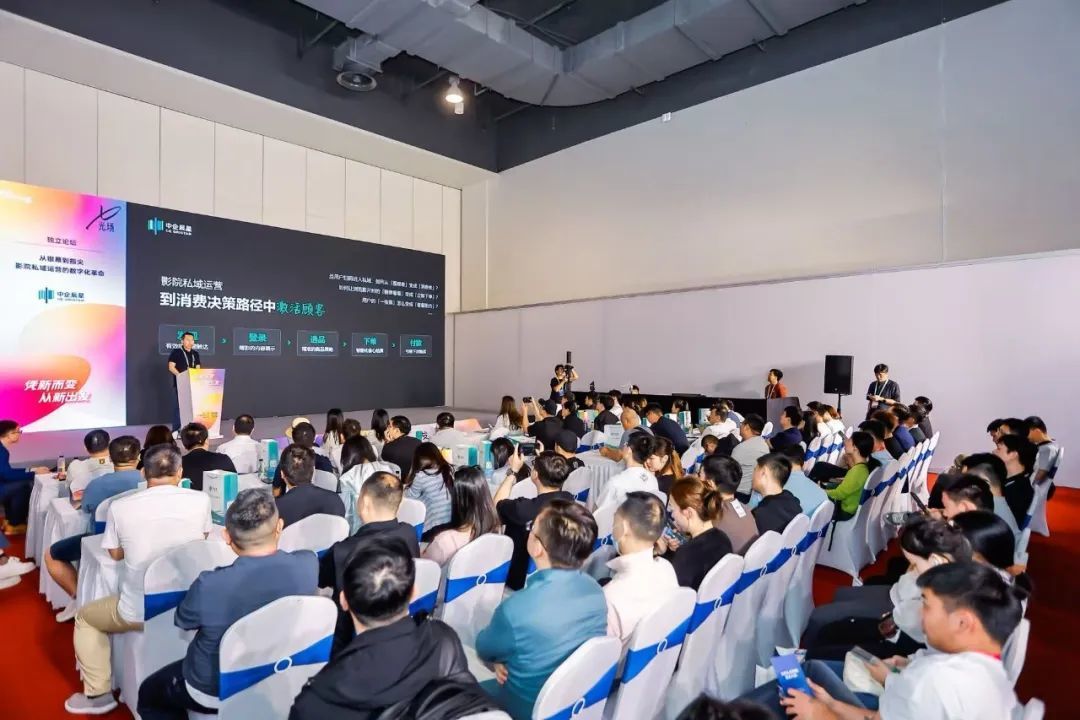
On June 12th, the CinemaS2025 Shanghai International Film Forum and Exhibition grandly opened at the Shanghai Cross-border Procurement Exhibition Center. At this annual event bringing together elites from the national cinema industry, Zhongqi Chenxing, as a promoter and practitioner of digital operations, hosted a special forum themed "From Screen to Fingertips—The Digital Revolution of Cinema Private Domain Operations," focusing on the trends, strategies, and practices of cinema private domain operations, sparking deep resonance within the industry.
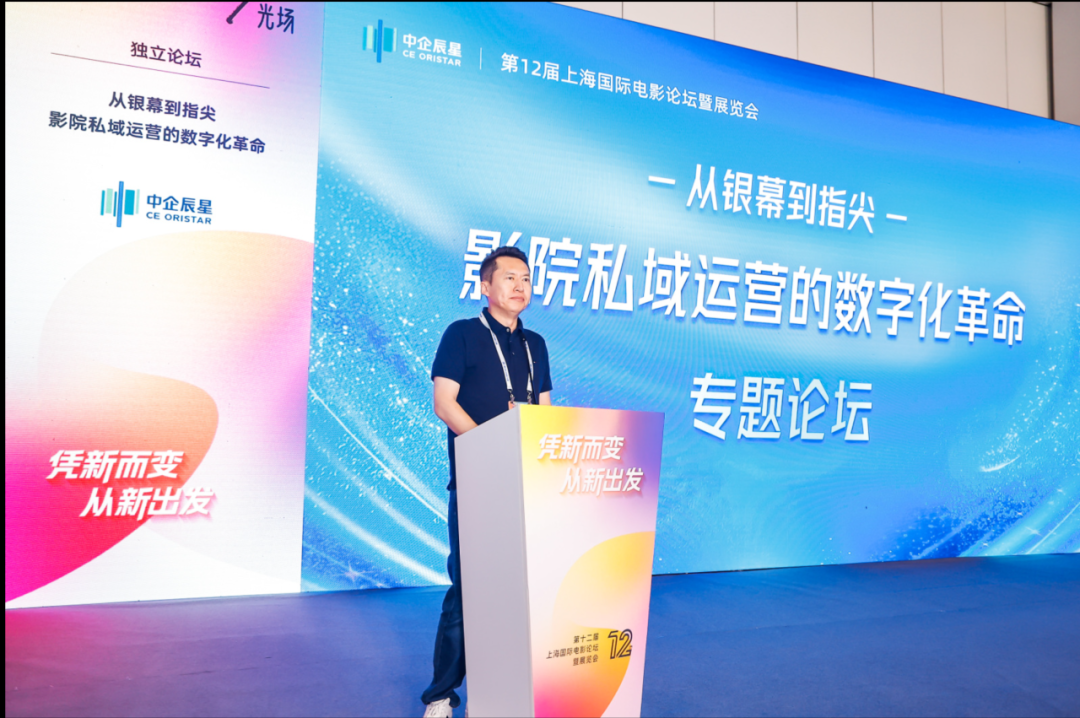
The forum began with, Han Zheng, General Manager of Zhongqi Chenxing, introducing the topic with a quote from Peter Drucker: "The purpose of a business is to create a customer." However, data shows that cinemas are facing the severe reality of "customers disappearing": In 2019, the number of moviegoers in China was 1.73 billion, while in 2024 it dropped to 1.01 billion, a 42% decrease in five years. With audiences continuously dwindling, the traditional cinema operating model centered on "ticket sales" is no longer sustainable, and the cinema industry urgently needs to find new growth solutions.
In Han Zheng's view, the path for cinemas to break through has shifted from "selling more tickets" to "finding more users." This means that cinema operations must upgrade from being "transaction-centered" to "relationship-centered," achieving growth by continuously connecting with users, stimulating interaction and repeat purchases, and reconstructing the growth logic. Cinema private domain operations are the key to this process.
Based on this, he proposed a "three-step method" for cinema private domains:
Reach: Design differentiated operation strategies based on user dimensions such as price sensitivity, content preferences, and consumption frequency. For example, push price-advantage activities to price-sensitive users, launch family movie packages for families with children, and plan diverse product combinations for high-value members. Only by "prescribing the right medicine" can we truly find audiences in diverse demand scenarios.
Activate: Turn "watching" into "ordering," and "single tickets" into "merchandise + benefits" combinations. Improve ticket conversion through the scientific conversion path of "discovery—login—selection—ordering—payment."
Retention: Build a dual-driven growth system of "benefits + emotions." Transform one-time consumers into the cinema's "super users" through points growth, periodic new privileges, and external resource linkage, allowing user relationships to have the potential for repeat purchases and expansion.
However, the real difficulty has never been the concept, but the execution. Han Zheng pointed out that cinemas currently face a double predicament of "lack of people" and "lack of tools," making it difficult to support 24/7 high-quality private domain operations. To address this, Zhongqi Chenxing launched the industry's first B2B2C cinema private domain operation model, driven by both products and services, breaking down complex operational work into standardized and automated modules, significantly lowering the threshold for implementation.
In addition, Han Zheng also envisioned the future landscape of cinema private domain operations: Based on user tagging systems, AI intelligent operations, and ecological network co-construction technologies and resource integration, cinemas will not only be viewing spaces but also have the potential to become aggregation platforms for users' lifestyles.
As a leading enterprise in the field of digital services for cinemas, Zhongqi Chenxing has served more than 4,300 cinemas nationwide, with over 1,000 private domain cooperation cinemas and more than 350 cinemas choosing to have their operations managed by the Chenxing team. With the decline of "traffic" dividends and the market focus returning to user assets, private domain operations are gradually becoming the underlying capability for cinemas to achieve resilient growth, providing the entire industry with a growth path from inventory competition to long-term value management.
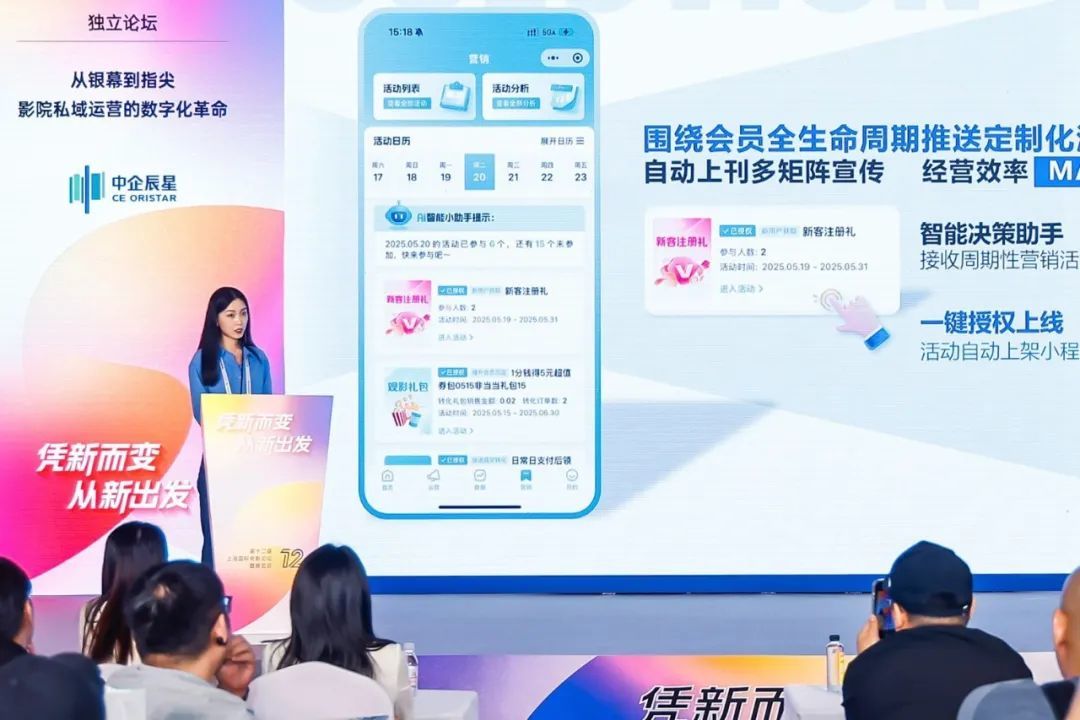
Subsequently, Shi Qianru, Operations Director of Zhongqi Chenxing, gave a detailed introduction to the B2B2C cinema private domain operation solution. In her view, the core challenge for cinemas is not "not wanting to do private domains," but "not being able to do private domains." Targeting the two major problems of "insufficient manpower and lack of tools," Chenxing uses a B2B2C private domain operation model to enter the entire cinema operation chain, building a truly implementable and reusable growth base.
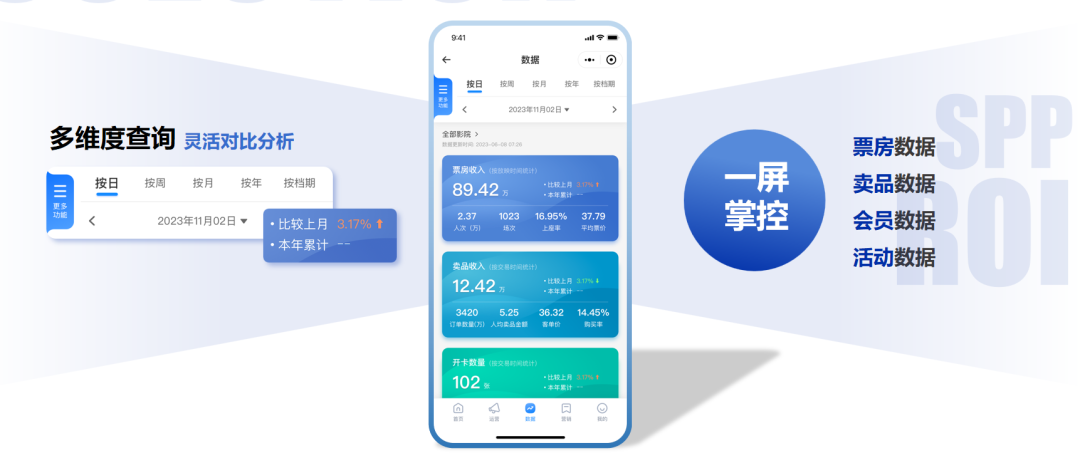
The underlying architecture of this model consists of two core digital products: "Intelligent Decision Assistant" and "Cinema Self-operated Mini Program." The former is for the cinema management end, and the latter reaches the user terminal. The two are deeply integrated, with data intercommunicating in real time, forming a closed-loop business logic, thereby reducing the cinema's manpower and technical burden in the marketing chain.
"Intelligent Decision Assistant" not only integrates the core functional modules required for daily cinema operations, such as scheduling management, data analysis, activity configuration, and material distribution, but also supports one-click activity launch, automatic content updates, self-media matrix linkage releases, and intelligent scenarios such as employee distribution and incentive tracking. Cinemas only need to complete authorization to achieve full-process "light operation," leaving daily tedious tasks to the system.
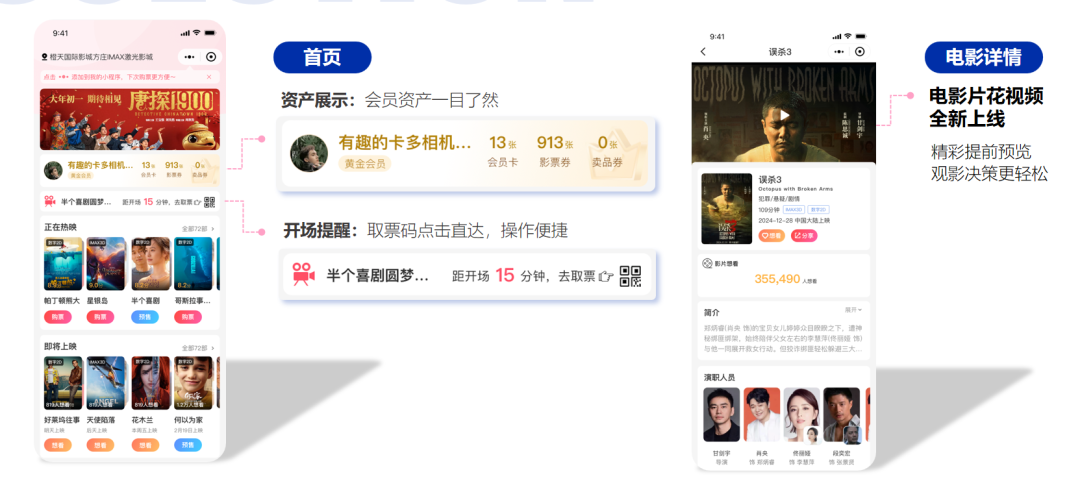
The accompanying "Cinema Self-operated Mini Program" is more like the cinema's "digital service front desk" for users. It not only undertakes ticketing and transaction functions but also effectively drives user activity and improves conversion efficiency through the design of member asset visualization, dynamic film content, merchandise linkage promotions, and precise consumer coupon delivery, strengthening the relationship with users in every visit.
It is worth noting that the two products do not exist in isolation but form an operational closed loop in a "data-driven + content-empowered" manner: User behavior data is transmitted in real time from the front end to the decision assistant to support backend content delivery and operational strategy optimization; Chenxing's professional operations team will also provide regular activity suggestions, content materials, and schedule operation support based on the specific situation of the cinema to ensure that the solution has long-term execution and adaptability. "We are not just delivering digital tools, but a complete and systematic private domain capability into the hands of cinemas." Shi Qianru emphasized that Chenxing's goal is to use a complete set of cinema private domain operation solutions to help cinemas truly "run."
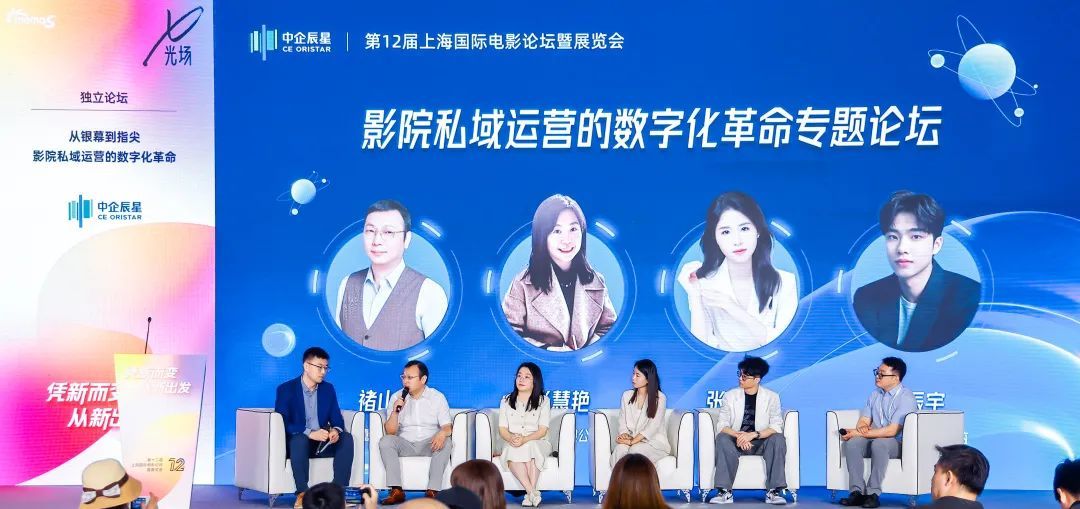
In the third segment of the forum, Zhongqi Chenxing specially planned a roundtable discussion themed "Path Selection and Implementation of Cinema Private Domains." Five guests from cinema chains, film investment companies, and the market frontline jointly conducted in-depth discussions on the strategic understanding, implementation practices, user value mining, and service expectations of cinema private domain operations, presenting a viewpoint confrontation with high industry realism.
Chu Shanxin (Chairman of Starlight Jia Ying Film, Strategic Partner of Zhejiang Starlight Film Co., Ltd.):
" The media forms of private domain traffic continue to iterate, from early QQ groups and blogs to WeChat Moments. Enterprises must keep up with the migration of user habits; the core of private domain operation is "where the users are, we go there." Essentially, it is to achieve business resilience through an independent traffic pool, especially highlighting its risk-resistance value during industry downturns. ”
Zhang Huiyan (Deputy General Manager of Guangzhou Performance and Film Co., Ltd.):
"By cultivating the membership system, integrating diverse business formats such as film, performance, and cultural and creative industries, continuously enriching user experience, expanding the traffic pool, and solidifying traffic into long-term assets, we continuously release the long-term value of cinema private domains."
Zhang Lunli (Vice General Manager, Unknown Film Industry):
“We effectively incorporate moviegoers into our private domain through public domain traffic generation, offline conversion, and community cultivation. Combining membership systems, promotional activities, and business alliances, we continuously activate fan communities, enhancing user stickiness and repeat purchases, achieving efficient conversion in private domain operations.”
Zhang Zhenyu (Marketing Director, Yangyuge Film Industry):
" The private domain can be seen as a new growth engine for cinema operations: It enhances user stickiness and interaction activity through public domain traffic generation and private domain cultivation; expands revenue scenarios through membership operations and merchandise sales; uses the private domain to achieve real-time feedback and operational optimization of user behavior; and simultaneously focuses on improving the user experience, optimizing user perception across the entire chain from system to service. ”
Liu Haibin (Product Director, Zhongqi Chenxing):
“Today's discussion has given me a deeper understanding of the importance of the private domain. Although the film industry is often considered to be "dependent on fate," I agree more with a line from "Nezha"—"My fate is in my own hands." To truly achieve independent growth for cinemas, we must have the ability to reach users, operate continuously, and manage user assets, and this is precisely the value of the private domain. A few years ago, when cinema private domain mini-programs were just emerging, everyone was very active, but due to the impact of the epidemic, many cinema operators were lost, resulting in a lack of people to plan activities ’、‘ a lack of people to design materials ’、‘ inability to operate push notifications ’ and other practical problems. Some cinemas even had only one person at the front desk supporting all daily operations.
To address these challenges, we have developed this product and, in conjunction with Zhongqi Chenxing's service team, provide cinemas with full-process support, from activity planning and visual design to system operation. Cinemas only need one-click authorization, and we can assist in completing activity configuration and material generation, and put the activities on the cinema's mini-program as needed, reducing operational thresholds and alleviating the burden on manpower. This is only the first step in building our product framework.

The cinema screen is the starting point for connecting audience emotions; the private domain at one's fingertips is an extension of managing audience relationships. In the current era of deep restructuring of the film industry, the challenges faced by cinemas are not only the difficulty of audience return, but also how to rebuild user relationships and reshape business logic. From the audio-visual feast on the screen to the digital connection at one's fingertips, cinemas are being redefined. Zhongqi Chenxing, taking cinemas as the core scenario, provides a private domain operation solution—a path to deep user connection—injecting new growth momentum into the film industry. This is not only a technological empowerment, but also a restructuring of the business model.
In the future, Zhongqi Chenxing will continue to use product strength as the foundation and operational strength as the support, empowering cinemas to navigate cycles and rebuild resilience, and explore a more sustainable and high-quality development path for the Chinese film industry in the wave of digitalization.



